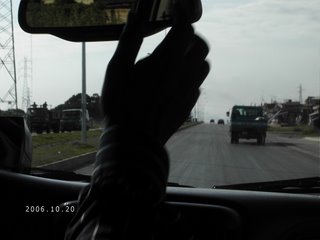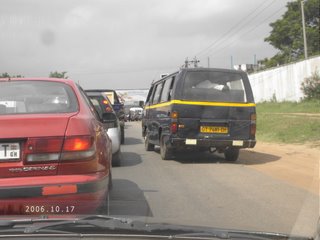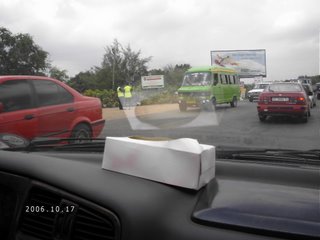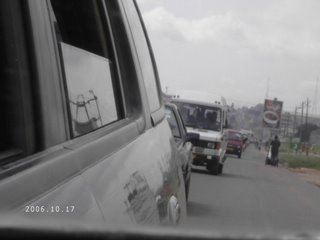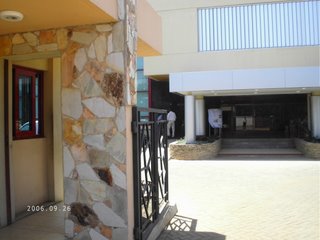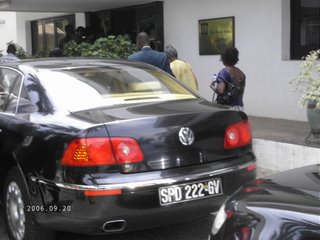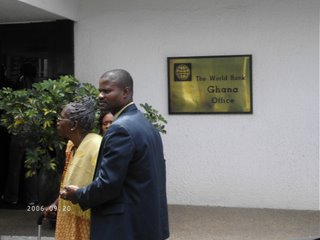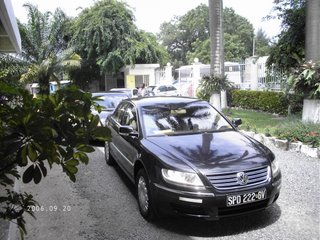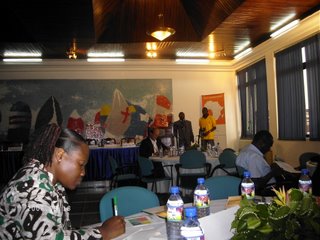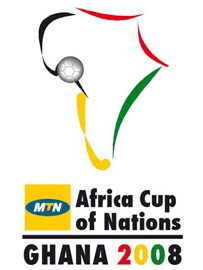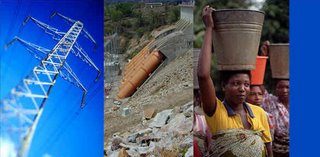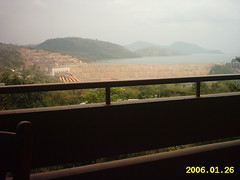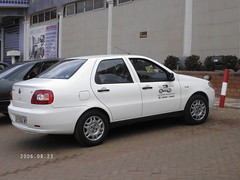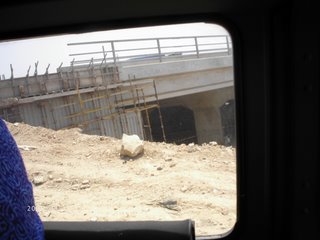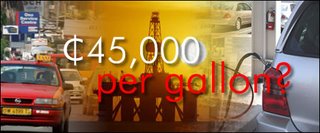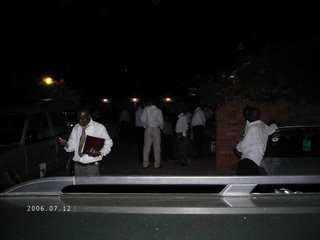
As I write*, the 7th ordinary session of the West African Health Organisation (WAHO)has opened in Abuja, with Ministers of Health from Benin, Liberia, Ghana; Sierra Leone; Senegal; and Niger attending.
Obasanjo has talked about how 12% of his country’s budget would go towards health, but African leaders had to make more effort for it to be higher if the MDGs could be met.
On another note, however, hearing and reading the news that Ghana would start using
ECOWAS passports concurrently within the country in 2007 got me thinking about the value-added from using both types. SO I did some research, and found an excellent article (
http://www.thisdayonline.com/archive/2003/05/21/20030521dev01.html) that indicated that it would be with a view to phasing out the national ones. In short, it would be a way of establishing a West African (ECOWAS) identity to the world.
Though it is true to say that when, say, you arrive in Ghana, you find an "ECOWAS" line, and other national’s line, the sentiments by a popular comedian, KSM, who joked that the latter line goes faster than that of ECOWAS holds very true!
It bears reminding that the ECOWAS region is the only in the West African, where there is free movement of people, as well as the freedom to reside. Perhaps, this quote explains it best:
It is part and parcel of the Protocol for free movement of people and goods. The ECOWAS Treaty provides for community citizenship and proof of that is for an individual to own a community passport to enable them travel within the region. It is an effort to promote in a general sense of African integration through regional integration. The ECOWAS passport is a supra-national instrument for travel, which all the ECOWAS States have recognised and are asking the international community to recommend. Consequently, it is more important than any of the national passports within the West African region. The holder is not considered a foreigner, and is free to pass easily through international borders without the rigour faced by non-ECOWAS citizens. It is meant to enhance regional integration.
Personally, all these developments attest to the
ECOWAS-ness, as it were, of the region. I am Ghanaian first and foremost, but I am increasingly feeling that there will come a time when I can well and truly call myself an "ECOWAS national". I am almost there, but once our leaders get their act together on Common External Tariffs and whatnot, with a view to the ECOWAS currency, the ECO, I might just feel a bit more like I am living in a region that is quintessentially West African.

To be fair, it is great to see that in a country like Ghana, a number of NIGERIAN banks have made their home: Zenith Bank (it even has a hotline now!--
http://www.zenithbank.com/); Standard Trust (
http://www.standardtrustghana.com/); and Guaranty Trust Bank (
http://www.gtbplc.com/portal/index.pl?id=35020), but it would be great to see a more concerted effort elsewhere other than the banking sector on regional integration.
Speaking of which, you must have heard about Liberia, and the celebration of 150 years of its independence from the US. Well, suffice to say, Ghana played an instrumental role in facilitating the developmenmt of Liberia’s electricity.
Perhaps, the
Statesman newspaper put it best in its editorial, entitled "
West Africa is our oyster" when it wrote:
"There is no way that West African countries can compete divided. But the policies at the ECOWAS level must be boldly translated on the ground by the private sector. What the V{olta} R{egional} A{uthority}, Government, Databank, Cal bank, Tropical Cable, etc, have shown is that a combination of the public and private sector can make Ghana ruthlessly competitive in West Africa and beyond."
I am highlighting, briefly, what the-above organisations did (the information was culled from the Daily
Statesman newspaper, a government-supportinig newspaper):
•
Databank Financial Services, Ghana’s premier investment bankers, went to work to structure the financing and provided risk cover to secure a loan of $1m from
Cal Bank to fund the project
• Next were the supplies. All in all, Liberia bought 1,200 light poles, the electrical wiring and four power generators, from Ghanaian companies in May, while VRA technicians were seconded theer to train local personnel, renovate and connect the system
• Ghanaian entrepreneur Tony Oteng Gyasi’s "
Tropical Cables and Conductors Ltd", a Ghanaian leader in manufacturing, procured the cables needed for the transmission wiring
• The wooden poles and stay blocks were provided by
Du Paul Wood Treatment (Gh) Ltd, a Ghanaian firm run by former Bank of governor, Kwabena Duffuor
• The huge
generators to provided the power for Liberia’s Capital city were also provided by a
Ghanaian company,
G&J technical Services Ltd., owned by Godfrey Asiedu
The
culmination of all these concerted efforts went to provide electricity for Liberia, a fellow ECOWAS country. Whilst the Statesman newspaper feels that this highlights the need to push for private sector led by Ghana, I am more of the view that it accentuates the possibilities within the region of a greater collaboration.
Sure, ECOWAS may be divided politically on issues of the free trade agreements with the EU over
Economic Partnership Agreements, and it is something that requires urgent attention in the sub-region, but, without a doubt, this could be the beginning of something better in ECOWAS.
The Drug MenaceLike a scene right out of Hollywood, the drugs affair exploded into the consciousness of Ghanaians a few weeks ago when some drugs disappeared off a boat, MV Benjamin, when it docked at Tema. Unlike in the 1995 gangster thriller,
The Usual Suspects, where $91 million of cocaine in a boat, docked at a pier in South Pedro, just south of L.A., exploded along with the boat, in Ghana, the boat, containing many millions of dollars worth of cocaine, simply disappeared—without a trace.
That is until the revelation of complicity over the drugs, followed by the swift arrest {on the orders of Attorney-General/Minister of Justice Joe Ghartey) of four putative drug barons two days ago at a public hearing under the aegis of Justice Georgina Woode’s eponymous committee that had been set up to look into the disappearance of the 77 parcels of missing cocaine.
One Assistant Commissioner of Police (ACP) Kofi Boakye, a charismatic director of police operations, was caught on tape in a discussion with some of these barons {in what the Chronicle entitled "
Kofi’s Convention with Drug Barons", which you can read here:
http://allafrica.com/stories/200608020897.html }, and now proceeded on leave with immediate effect.
Perhaps, I have done a great disservice to the multiplicity of events that have unfolded in between, simply because I am not seeking to re-hash what the press has said, but merely to give one a bigger picture about the drug menace, and how it is threatening to engulf the Police Service in a maelstrom of yucky finger-pointing tags of corruption. If you want more information, please go to this link here:
http://news.google.com/news?sourceid=navclient&ie=UTF-8&rls=GGLG%2CGGLG%3A2005-34%2CGGLG%3Aen&tab=wn&q=Ghana+drugs+; and
http://www.ghananewstoday.com/gnt_cn_detailb.cfm?tblNewsCatID=51&tblNewsID=1097.
As I pretty much intoned
two weeks ago when the popular musician, Daasebre, was caught in London, it’s pretty much time that the sub-region looked more closely at the formulation of an anti-drugs policy. Ghana is now incontestably a transit point for drug smuggling. Incidences of abuse may be low as compared to other countries, but I really do hope that people do not begin to see that stability, or being an
"island of peace" is going to operate against the country in the most nefarious manner.
Food for thought: news in this morning from the
Chronicle, indicates that "More cocaine arrives - Another £1m worth intercepted at Dabala". Read it:
http://www.ghanaian-chronicle.com/thestory.asp?id=11086.
This time, it was a cross-border (ECOWAS) crime. Enough said?
*the section on Liberia was written last week"as the week draws to a close in Accra"




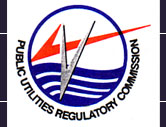
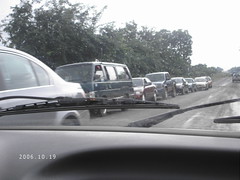
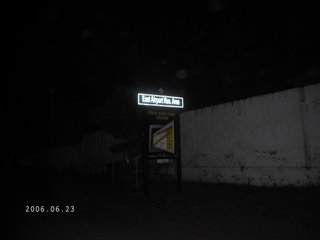

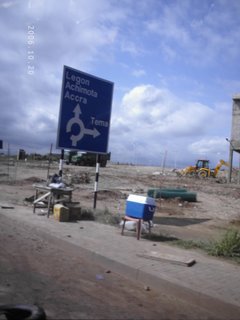
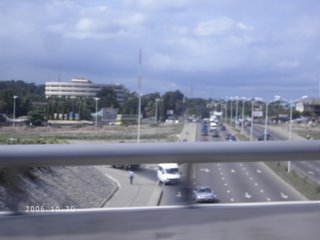 nice, aerial view of the Tetteh-Quarshie interchange (right)
nice, aerial view of the Tetteh-Quarshie interchange (right)